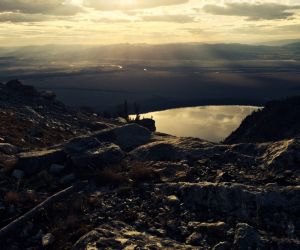Because It’s Not There

This version of the three bears has nothing to do with the temperature of porridge or comfort of furniture. It is not a children’s parable about the joys of breaking and entering. Rather, it begins with a discomforting story about figuring out whether the grunting beast fifty feet away from the tent is a black bear, brown bear or grizzly bear.
City kid that I am, I can’t say we covered the nuance of aural indicators of the three species in school. But the grunting and splashing at twoish in the morning at lake’s edge has me curious about which of the three bears it is. Potential impending death (read: grizzly) can make you curious. Peeling the tent zipper open a few inches as quietly as a surgeon slices (skinzipper – anyone patent that yet?), the moon is bright enough to make out the camp visitor, but not bright enough to accurately discern brown from black. I don’t think it’s a grizzly, but it could be a brown bear, so I quietly click the safety off the bear spray. At this moment in time, I’d prefer to be clicking off the safety of a .45. Welcome to Grand Teton National Park. Sweet dreams.
Why do I like climbing mountains? Because tomorrow night, camped above the treeline, I won’t lose any sleep to bears. There’s no reason for them to be at that altitude. Of course, there’s no reason for any non-marmot mammal to be at an altitude above which trees have given up. So why do some of us find ourselves there?
The most famous answer is a quote missing a great deal of context. George Mallory was touring America in 1923 to raise money for a third attempt on Everest when his rationale for the adventure was summarized in a three word quote in the New York Times; “Because it’s there.” His fuller explanation was … well, fuller; “People ask me, 'What is the use of climbing Mount Everest?' and my answer must at once be, “It is of no use.” There is not the slightest prospect of any gain whatsoever. Oh, we may learn a little about the behaviour of the human body at high altitudes, and possibly medical men may turn our observation to some account for the purposes of aviation. But otherwise nothing will come of it. We shall not bring back a single bit of gold or silver, not a gem, nor any coal or iron... If you cannot understand that there is something in man which responds to the challenge of this mountain and goes out to meet it, that the struggle is the struggle of life itself upward and forever upward, then you won't see why we go. What we get from this adventure is just sheer joy. And joy is, after all, the end of life. We do not live to eat and make money. We eat and make money to be able to live. That is what life means and what life is for.”
George Mallory would die on Everest within a year of the “Because it’s there” quote in the New York Times. While Everest is in an entirely different league than the climbing 99% of climbers undertake, the (false) braggadocio of the three words which fit a convenient narrative in a newspaper one day in 1923 has stuck to one of the only three human endeavors Hemingway honored with the designation “sport”. Bull-fighting and motor-racing are the other two sports, Hemingway observed; all the rest were just “games” to him.
It’s not a game, sport, vocation or even highly developed skill of mine just yet. It is a bit of a fascination though, and one that requires more than “Because it’s there” to justify. There are several small reasons and one big one. The small ones first – there’s a clear and unambiguous goal, preparation serves a broader purpose of cardio exercise and I’ve found (so far) that mountains are “jerk-free” zones. This last small reason (together with the view) is almost reason enough to join up. The camaraderie of pain above the treeline forges a brother / sisterhood where everyone pitches in to help and is supportive. Sort of how life is supposed to work everywhere, but doesn’t.
All those are fine and serviceable reasons (have I mentioned the view?) but my current fascination with the sport is it is the most completely immersive experience I’ve yet stumbled upon. In a place where nothing – not the mountain, not the weather, certainly not gravity – cares whether you live or die, everything matters. Your equipment, your preparation, the knot you just tied, where your next foot will step, where the next five handholds are … it all matters. The processing of all that in real time (particularly at a below average skill level and above average age) leaves zero room for extraneous thought. What a gift that is.
Given the wiring harness I was provided at birth, time flowing by without stray thoughts is an exceedingly rare occurrence. Finding an activity where that occurs is a blessing. I don’t enjoy climbing for the dominion of it, because “it” (the mountain) is there. I enjoy it because “it” (the conscious me) is not there.
There’s usually good news in these stories and the good news is you don’t have to climb mountains to find full immersion in a life pursuit. You could just as easily sit at the piano. Or write code. Bake pies. Play pickleball. Whatever. Professor Mihály Csíkszentmihályi calls this state of optimal experience “Flow”. It is where the difficulty of a task you are interested in increases at the pace your skill improves. If the difficulty exceeds your skill, you feel anxious. If your skill exceeds the difficulty, you become bored. If you can find a place in space and time where both skill and difficulty are both increasing at sustainable levels, congratulations Goldilocks; you’ve found what’s just right.

